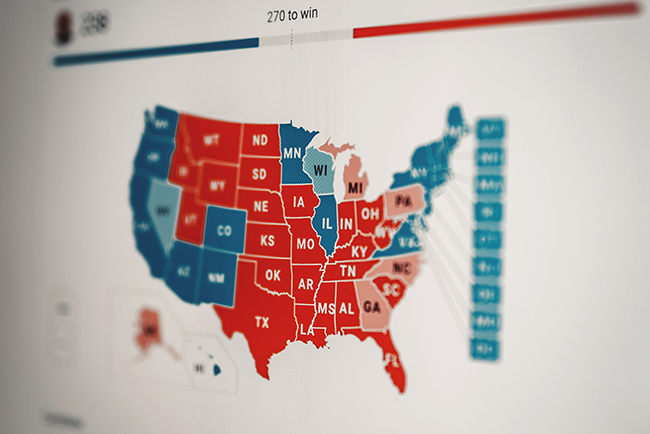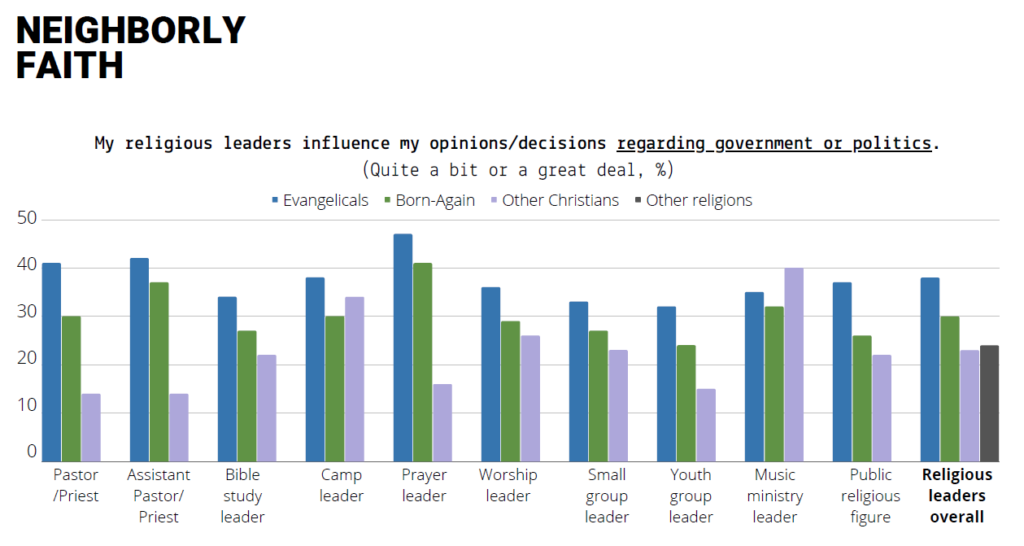
Pastors have the opportunity to connect with young people over politics and to inform how Gen Z shows up as Christ’s ambassadors.
By Kevin Singer
To what extent a church can engage with political campaigns, and how publicly supportive a pastor can be of a particular candidate, is a matter of ongoing debate. In 2020, Lifeway Research found that while just 1% of pastors endorsed a candidate for public office during a church service that year, around a third of pastors (32%) personally endorsed political candidates outside of their church role, a 10-point jump from 2016.
Often, conversations about pastors’ political influence are clipped at whether or not, and in what settings, they endorse candidates. After all, endorsing or opposing candidates is of most interest to IRS laws. “Church leaders have two choices when it comes to elections: Give up their tax-exempt status and endorse candidates during services or abstain from breaking the law and keep it,” political commentator Nicole Russell wrote for the Fort Worth Star-Telegram.
With Gen Z’s impact on 2022 elections, many are asking who’s influencing their politics and where they’re getting their ideas. A new study from Neighborly Faith found that, for young evangelicals, the answer is clear. More than their peers of other Christian traditions and religions, young evangelicals find inspiration from their faith leaders. These could include pastors, youth pastors, and Bible study leaders.
“Whether they realize it or not, evangelical pastors have a formidable impact on young believers' political beliefs and behaviors.” — @kevinsinger0 Click To TweetWhether they realize it or not, evangelical pastors have a formidable impact on young believers’ political beliefs and behaviors. And that impact extends far beyond candidate endorsements. Given the plethora of voices in politics confronting young people, pastors need to consider how to steward their influence well.
The power of the pastor
The study, Who Is Influencing Young Evangelicals on Politics? How Religious Leaders Shape Evangelical Young Adults, was conducted in partnership with Springtide Research Institute. The study surveyed 2,000 young people ages 18-25, including 473 evangelicals.
Major findings include:
- Young evangelicals were the only group in the study to select religious texts and faith leaders as the greatest sources of influence on political issues in their lives
- Young evangelicals’ political opinions and behaviors are shaped by a variety of pastors and lay leaders
- Young evangelicals are significantly more likely to view their faith leaders as mentors than other Christians and those of other religions
- 40% of young Evangelicals agreed their faith leaders discuss political engagement often or extremely often, compared to 25% of other Christians and 26% among other religions
We suspect that encouragement from pastors and lay leaders is why young evangelicals are more likely than their peers to believe political activities are important and to participate in political activities like volunteerism, charitable giving, voting, engaging with government, and advocating policies. On average, 42% of young evangelicals are engaged in some political/civic activity, compared to 26% of other Christians, 27% of other religions, and 26% of the non-religious.

Stewarding political influence
Given the polarizing political climate we are living in right now, some pastors are hesitant to discuss politics. One 9Marks headline from 2020 says it all: “How to Hold Your Tongue About Politics And Thereby Not Split Your Church Over Things the Bible Doesn’t Talk About.” Narratives like these result in people synonymizing politics with danger and risk in church contexts. But in reality, this study suggests political engagement may be a promising area in which to disciple young believers.
For Gen Z, there is a close relationship between politics and their day-to-day lives. Political movements like Black Lives Matter, clashes on issues like abortion, and philosophies like Critical Race Theory demand responses from members of Gen Z. And these demands seemingly come on a moment’s notice, with their reputations and relationships on the line. Opportunities to “give a defense…with gentleness and reverence” (1 Peter 3:15-16, CSB) on political issues are numerous and cutthroat. Gen Z needs guidance from pastors on how to navigate these opportunities. Don’t shy away from political topics when engaging with youth; engage them. Role play a difficult political conversation they might encounter in college, discuss different approaches, and provide feedback.
Informing political perspective
Young evangelicals, like their peers, have a heart for justice and uplifting those with no voice. They often support access to healthcare, racial justice, compassionate immigration policies, gun reform, climate, and prison reform. This doesn’t automatically mean they are progressive. Some sense that using political means to care for suffering people is biblical, though they may not be sure how to articulate the connection. Without your guidance, they may try to fill the vacuum with secular perspectives. Consider that an ill-informed perspective on political issues, because a pastor hasn’t found the time to think carefully, sends a message to young believers.
“More than trying to not break IRS laws, pastors should consider the opportunity they have to connect with young people over politics and inform how Gen Z shows up in the political realm as Christ’s ambassadors.” — @kevinsinger0 Click To TweetIf this study says anything, it’s that young evangelicals are watching pastors closely. What pastors say or don’t say, do or don’t do, is likely consequential for young believers’ political beliefs and practices. More than trying to not break IRS laws, pastors should consider the opportunity they have to connect with young people over politics and inform how Gen Z shows up in the political realm as Christ’s ambassadors.

Kevin Singer
Kevin is head of media and public relations for Springtide Research Institute and teaches religious studies courses at community colleges. He was involved with North American Mission Board church planting from 2009-2014.
For permission to republish this article, contact Marissa Postell Sullivan.







